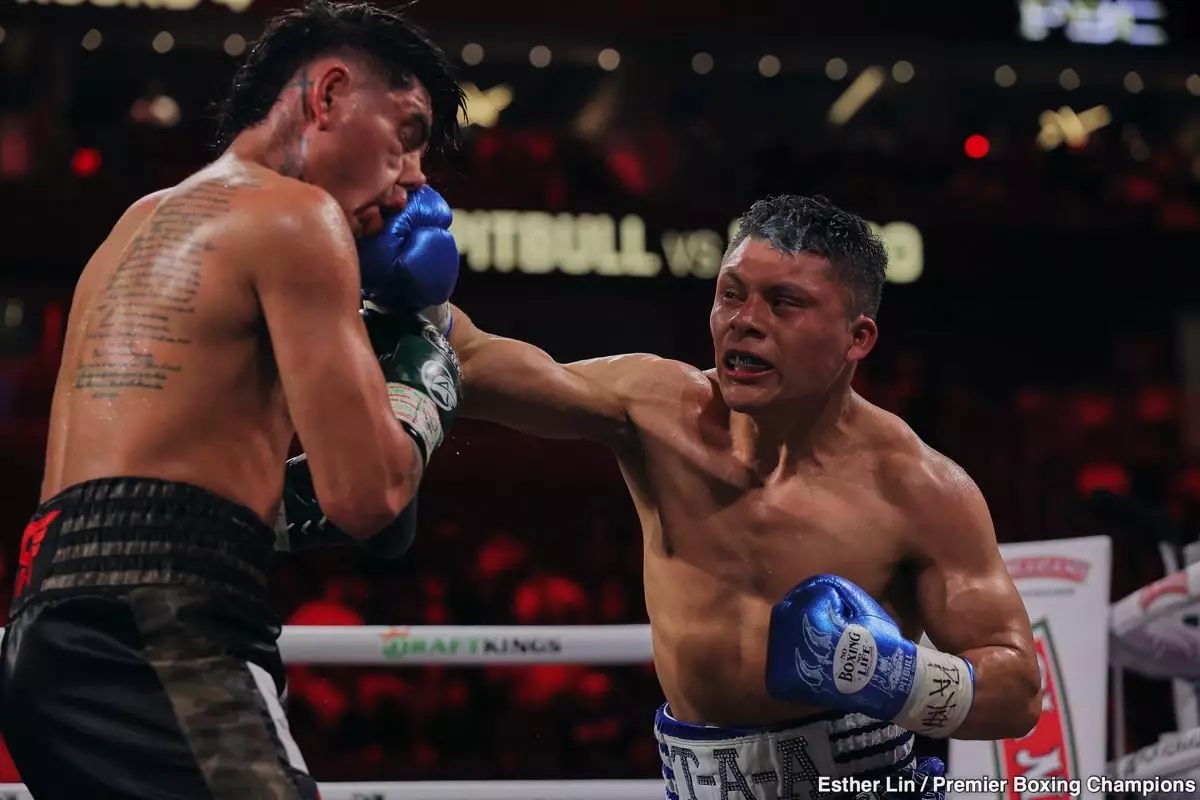Keyshawn Davis, an emerging star in the boxing world, is making headlines with his aspirations for his first title defense of the WBO lightweight championship. His targeted opponent, Isaac ‘Pitbull’ Cruz, could potentially catapult Davis to pay-per-view (PPV) stardom if he secures a victory. However, the road to this matchup is riddled with uncertainties and challenges that point to a larger narrative about the dynamics of boxing and the paths fighters take to achieve prominence.
With a professional record of 13 wins and no losses, including 9 knockouts, Davis exudes early confidence in his ability to solidify his stardom through a bout with Cruz, whose own record stands at 27 wins, 3 losses, and 1 draw. The implication that defeating Cruz would transition Davis into a PPV attraction may sound compelling at first glance. However, one must question whether a victory over Cruz would validate such a claim. After all, previous fighters like Jose ‘Rayo’ Valenzuela, who fought and lost against Cruz, have not transformed into PPV sensations.
Davis’s assertions hinge on a rather flimsy argument: that defeating Cruz would inherently catapult him into mainstream success. It’s vital to assess the current boxing landscape realistically; not every significant win translates to marketability or viewer interest. Indeed, potential matchups are determined not only by skill but also by narrative, history, and, importantly, audience appeal.
What remains unspoken by Davis is his contingency plan should Cruz opt to decline the bout—a scenario that seems increasingly plausible. Experienced boxer Andy Cruz represents a challenge as a likely replacement. With a perfect track record of 4-0 against Davis, a fight against Andy would carry personal stakes for Davis, who may prefer to avoid this encounter altogether. This hesitation points to a recurring theme in boxing: the strategic selection of opponents.
Boxers like Davis may appear inclined toward easier paths, consciously opting for fighters they believe offer a guaranteed victory, rather than engaging with proven contenders. This tactic complicates the narrative of aspiring champions who want to be seen as legitimate stars. If Davis were to sidestep high-stakes matches in favor of more accessible competitors, it risks tarnishing his ascent and tainting public perception of his capabilities.
Davis’s confident callout of Cruz is contingent not only on Davis’s desires but also on market realities. He suggests that a fight between himself and Cruz would be a lucrative affair, particularly due to their ethnic backgrounds—that matchups between Mexican and African American fighters tend to sell well. While there’s certainly a cultural rapport that can translate into heightened viewer interest, Davis’s assertion seems naive given Cruz’s own recent decisions in the market.
Cruz’s rejection of lucrative opportunities, such as a fight against Ryan Garcia, underscores his position. If he is turning down significant bouts, it remains unclear why he would consider a fight with Davis for potentially less payoff. Boxing negotiations are fraught with complexities, and fighters often weigh financial compensation alongside competitive opportunities.
To stage a successful event, Davis’s management would need to navigate numerous logistics, ranging from venue selection to promotional support. While Davis dreams of a grand showcase in Las Vegas, the realities of attendance and ticket sales often tell a different story. Not all events translate to profitable ventures, especially if the audience is not sufficiently drawn to the fighters involved.
Cruz’s size and reach—standing at 5’4″ compared to Davis’s 5’9″ stature—further exacerbate the uphill battle for Cruz. This potential physical mismatch could lead to one-sided matchups, raising concerns about competitive integrity and fan interest. If Davis can leverage his advantages and make a name for himself without risking meaningful bouts against skilled opponents, the question arises—what does it say about his ambition and the pursuit of boxing stardom?
While Keyshawn Davis’s aspirations for a fight against Isaac Cruz represent a desire for recognition and marketability, the realities of boxing and the intricacies of matchmaking present formidable barriers. Without a clear understanding of the business landscape and the willingness to face genuine challenges, Davis’s journey may become stalled. The road to becoming a PPV star is indeed littered with obstacles that require more than just ambitious talk; they demand strategic foresight, calculated risks, and, ultimately, a commitment to genuine competition. As the boxing world keeps a keen eye on Davis, it remains to be seen whether he transforms ambition into reality or merely fades into the background of what could have been.

